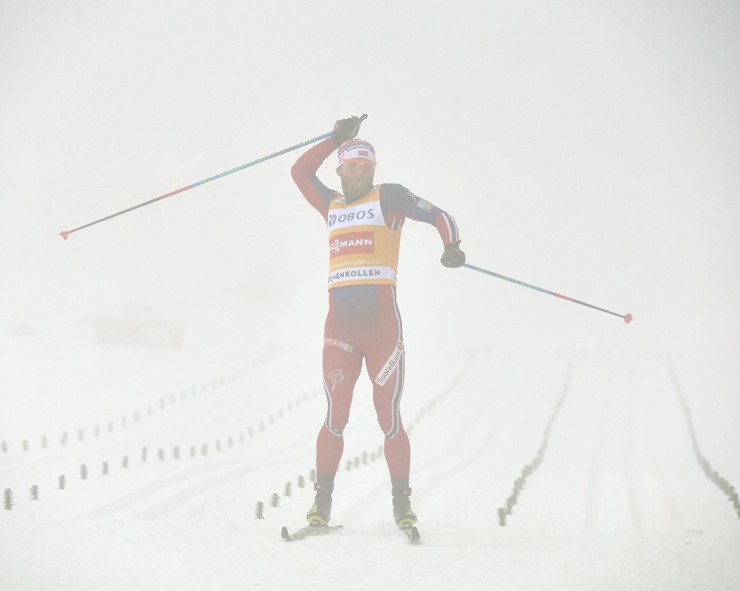
“It’s always been a dream for me to win this race, from when I was nine years old and tenting in the forest, cheering for all the big skiers at the time,” Martin Johnsrud Sundby said in a post-race press conference after winning Saturday’s 50-kilometer classic mass start held at the historic Holmenkollen stadium outside of Oslo, Norway.
A perennial favorite at his home stadium in his hometown of Oslo, Sundby, landed on the podium in his four previous starts at the Holmenkollen 50 k, but the victory eluded him. Last year he finished third, half a second behind race winner and teammate Sjur Røthe.
In an interview last year with the International Ski Federation (FIS) media’s Inside the Fence series, Sundby spoke of growing up on the track, “I did my first competition here as a 9 year old. Since then I’ve done probably over 100 competitions at this place. I have trained probably five thousand hours at this track. This is my home ground.”
On Saturday, Sundby, who leads both the overall and distance World Cup, made no mistake that he would finally come away with a victory. With King Harald of Norway in attendance, the 31-year-old race favorite gunned it out of the stadium, appearing to want to weed out any potential chasers within the first few kilometers.
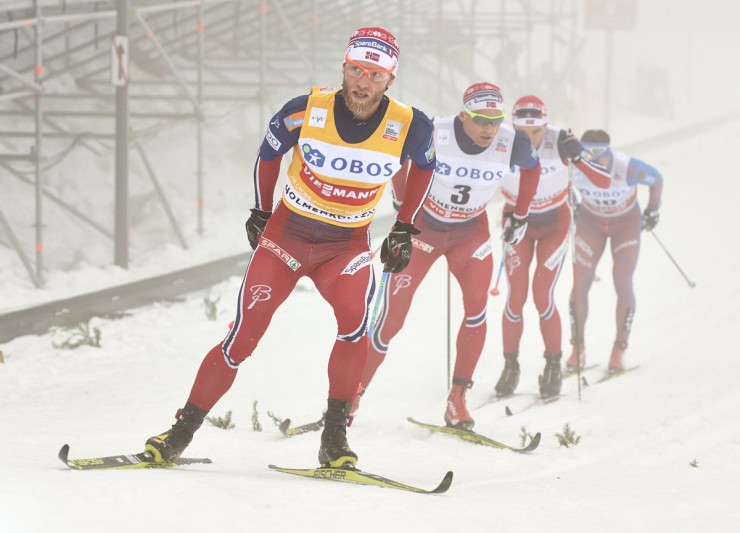
“My strategy for today was to shock the others from the start,” Sundby told reporters following the race, “Nobody expected that kind of pace from kilometer one, and I think I’ve never been skiing that fast for 50 k.”
Despite warm temperatures and dense fog, the damp conditions did not seem to impact the lead racers. Instead it was Sundby’s blistering pace that thinned the group.
Only 13.3 k in, a pack of three remained in contact Sundby as they charged through the fog: Norwegians Niklas Dyrhaug, 28, and Didrik Tønseth, 24, followed by Russia’s 33-year-old Maxim Vylegzhanin. Ten seconds behind these four was the main chase including past Holmenkollen champions, Norway’s Røthe and Petter Northug Jr., and last year’s runner-up Dario Cologna of Switzerland.
Five kilometers later, at 18.8 k, the lead pack pushed their gap to 25.5 seconds over the chase. Leading the chase pack, Andrey Larkov, Alexander Bessmertnykh, Sergey Turyshev, Nikita Stupak — all from Russia — appeared set on tracking down and joining their teammate Vylegzhanin at the front.
Less than a kilometer later, at the bonus sprint at 19.6 k (there was one on each of the six laps), Sundby gapped his three challengers, putting 4.6 seconds between himself and Tønseth. Although they reeled him back in at this point, Sundby made these moves throughout the day in an attempt to break free. By continuously pushing the pace, Sundby claimed all six of the World Cup bonus point preems throughout the course.
At 24.9 k, roughly halfway through, the lead pack of four soldiered on, with the three challengers to Sundby absorbing every surge he attempted. Back in the main chase pack, the Russian attack of Larkov, Bessmertnykh, Turyshev and Stupak settled back in. While the Russians appeared positive for the chase, the group of 13 were taking the brunt of Sundby’s relentless attacks. Failing to match his relentless speed; they slipped 47 seconds behind.
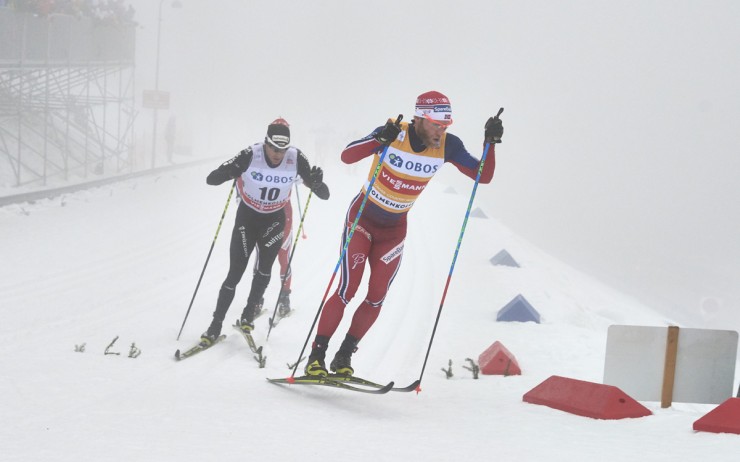
Colonga, an early challenger around 11 k and a presence within the main chase, abandoned the race near the halfway point. Bothered by a left calf injury that occurred during the Tour de Ski, Cologna hoped to make a comeback for Holmenkollen. After the race he told Neue Luzerner Zeitung, a Swiss-German paper, “The calf was not strong enough for the fifties,” referencing that he believes he can compete in shorter races, but the longer marathons are not yet possible given the severity of the calf strain he suffered in January.
On course, Sundby’s charge continued. At the second of two possible ski changes at 33.3 k (the first was at 6.6 k), the gap over the main chase grew to 1:10.3. The only skier daring enough to try to bridge that gap between the main chase and Sundby’s group of four, Turyshev, made it as close as 40 seconds back.
An hour and half in, and on their fifth of six laps, Sundby’s energy finally proved too much for Tønseth and Vylegzhanin. Over two large climbs, Sundby’s powerful stride put him and Dyrhaug 15 seconds ahead Tønseth and Vylegzhanin. After the race, Sundby reflected this move was essential to holding off the strong-finishing Vylegzhanin, “I was a bit afraid of Vylegzhanin; he has great finishes when he is in shape. I was actually quite happy when me and Dyrhaug put some seconds on him in the fifth lap.”
Dyrhaug clung to his teammate, telling FIS afterward that he “felt strong especially on the uphills,” albeit describing the race as the “hardest race I have ever skied in my life.” He matched Sundby stride for stride until just before 44.6 k, where Sundby built a 13.6-second lead that would last until the finish.
According to NRK, Sundby wanted Dyrhaug there to pull him through the final few kilometers. However, Dyrhaug could not match the pace any longer, telling NRK, “He wanted me there and go. I said, ‘It’s not going to happen. Sorry, buddy.’ ”
Behind Dyrhaug, the race for third dissolved as Vylegzhanin dropped Tønseth, opening up 14.2-second gap on the third Norwegian at the final 44.6 k time check. Farther back, Turyshev maintained his pace within the top five, 2:21.4 behind Sundby and 1:01.5 after Tønseth.
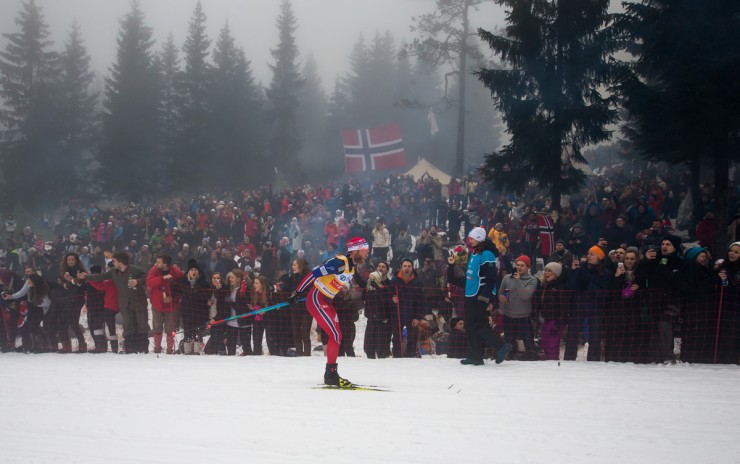
Sundby emerged through the fog and into the stadium alone. Down the finishing stretch, he pumped his fists, a final celebration of a victory that’s been a long time coming. After crossing the line with a victory in his record fifth-consecutive World Cup podium at the 114-year-old Holmenkollen event, he kissed the snow, paying homage to the historic course.
Following Sundby in second place, 18.8 seconds behind, his teammate Dyrhaug celebrated a personal best in the 50 k event. In third, 1:05.4 after Sundby, Vylegzhanin, broke up the Norwegian podium. Tønseth clung on to finish fourth (+1:36.3). Turyshev, who skied the majority of the second half of the race alone, rounded out the top five, 2:35.8 behind Sundby and 25 seconds ahead of Northug in sixth.
Northug edged out an eight-man race to the line, with sixth through 13th finishing within 5 seconds of one another.
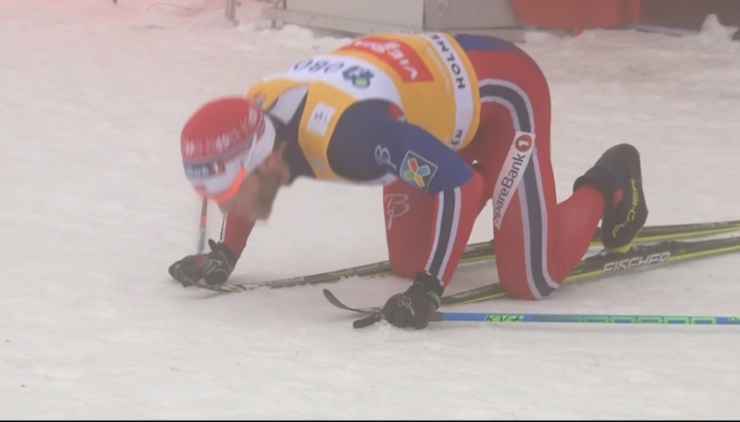
With the victory, Sundby leads the overall World Cup by 720 points over fellow Norwegian Finn Hågen Krogh, who did not race on Saturday. Northug sits in third, 22 points behind Krogh.
In the Distance World Cup, Sundby remains in first by a comfortable 473 points over Dyrhaug in second, and Røthe, who placed 10th on Saturday ranks third, 58 points behind Dyrhaug and just 1 point ahead of France’s Maurice Manificat in fourth.
None of the French skiers started Saturday’s race. Of the 19 Norwegians in the race, 10 placed in the top 20 and five were in the top 10.
“It sounds strange, but even if it’s no championship, this means a lot to me.” Sundby said in the post race press conference with a glint of sentiment towards finally breaking through at the fabled race.
Notes
- Sundby appeared to take a couple skate strides up and over the final bridge into the stadium. While XC Skiing News reported that he skated, Sundby did not mention that the jury had spoken to him about it. The incident was captured in this Vine:
- Four North Americans landed in the top 30: Canadians Alex Harvey, 20th (+5:49), Devon Kershaw, 23rd (+6:08.8) and Graeme Killick, 30th (+8:08.4), and American Noah Hoffman in 24th (+6:09.5).
Jeremy Blazar
New to the FasterSkier team, Jeremy has been involved in many facets of the ski community since he began ditching middle school to go skiing. When not daydreaming of the Birkie, he finds time to explore the fishing and trail-running opportunities of his new home, Seattle, Wash.



